In the century of probes on Mars, virtual reality, and Artificial Intelligence, not even a quarter of the population have twelve or more years of education in Nepal (see chart below)!
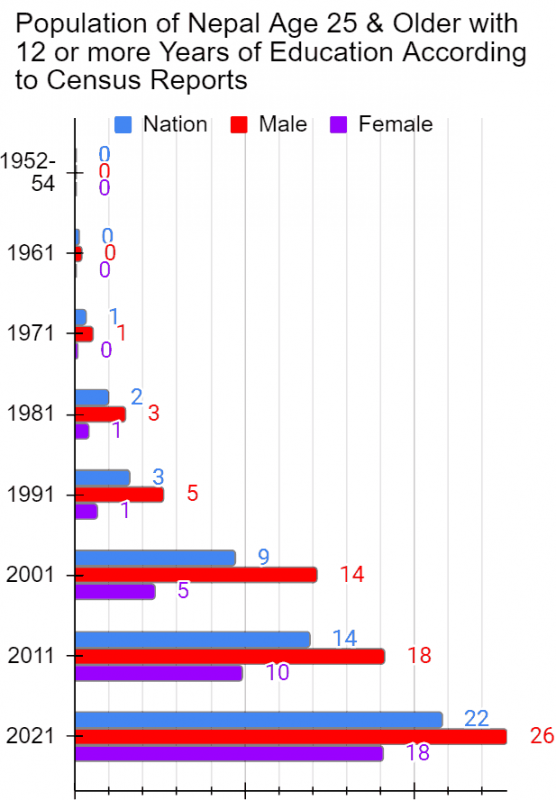
As you can see, only about 22% of the population have twelve or more years of education. The quality of education is abysmal anyway. Education at all three levels — primary, secondary, and tertiary — is mostly, if not entirely, about rote-learning and regurgitation. So, how many of those 22% possess higher level thinking skills? Likely a minority!
Worse still, we don’t even have 100% literacy (see chart below).
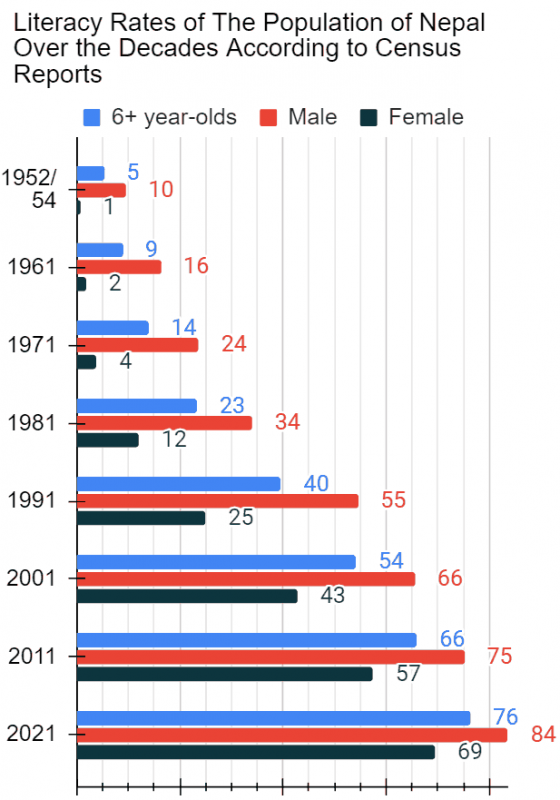
The education level of the mother, studies have shown, has a disproportionate influence on the children. But as you can see, the low levels are even lower for women!
That has had and continues to have many devastating consequences for the country. One is that a vast majority of the population hold traditional beliefs and follow traditional practices still. Child-rearing practices is but just one such example where doing so they invariably make major mistakes.
Raising boys, for instance, Nepali parents don’t really end up raising them, as it were. I say that because what parents do for their little boys they end up doing even for their adult sons, which is to pamper them and then pander to them.
What percentage of Nepali parents make their boys fetch water from the communal taps, wood from the forests, clean around the house or the house? What percentage teach them to cook, to make the bed, to do the dishes, the laundry, to clean their rooms, to make tea for their mom or sister etc.? Likely a small percentage. Of course, most Nepali parents make sure to teach most — if not all — of their daughters to do all that and more.
Understandably, Nepali parents might tell you that NOT doing so they are just expressing and showing their love for their boys. Many might tell you that they even enjoy doing everything for their sons or have everything done for their sons. And I am sure that is all true.
But, how many have ever wondered or ever wonder about the consequences of that to their sons and, more broadly, to the society?
And, interestingly, if all that pampering and pandering produces a good-for-nothing son, the pretty widely implemented “solution” is to marry him off! That is find girl to pamper and pander to him.
Good-for-nothing or not, according to 2021 Census Report, 85% of married men had been married (off) before they had turned 25, that is before their brains had fully developed and graduated to adulthood, as it were. According to the same report, 77% of married females had been married (off) while they were still just 20 or younger (see below)!
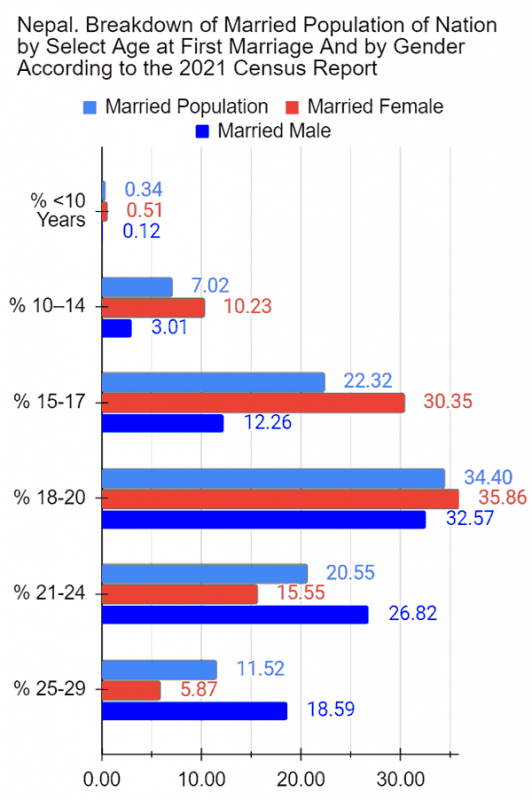
In other words, a vast majority of married men — more than 4 out of 5 — had been paired off with a female before becoming an adult. As for the the women, also a vast majority — more than 3 out of 4 — had been paired off with a male while they had still been a child!
Here are the raw numbers.
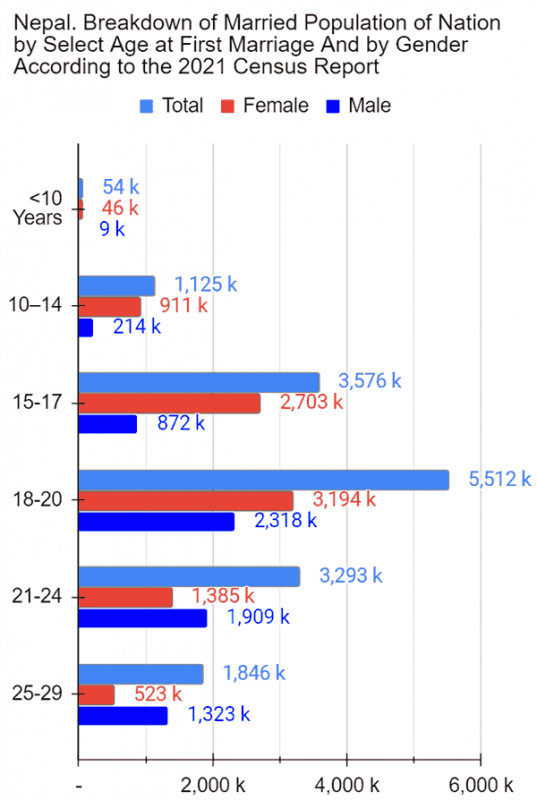
In other words, over five million boys had been married (off) before they had turned twenty-five. What I would like to know is how many of those marriages had been of good-for-nothing sons arranged for by their parents, believing that marrying them off to girls even YOUNGER than them would “straighten” them out?
If that does NOT appear to have worked, the parents do something even crazier: pressure the couple to have children!
Those appear to be pretty widespread beliefs and practices, the logic of both has failed me, something I raised on twitter and had a discussion around with a friend.
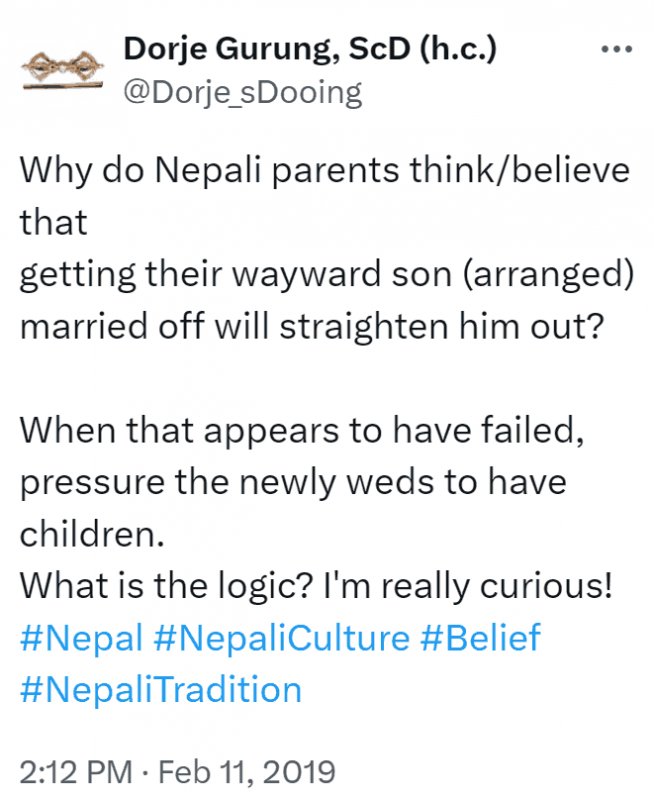
Of course, there is NO logic. It’s meant to really just demonstrate to the boys and men in the society that girls and women are expendable — there to cater to their needs and desires, and not much else.
Parents making sure their sons aren’t inconvenienced anywhere near as much as their daughters and finding a girl who gives continuity to the pampering and pandering to their needs is to reaffirm the Nepali society’s higher value and importance placed on them and their lives, and Nepali society’s belief that they are entitled to male privileges. That kind of upbringing cripples boys in many ways, among other things, but what percentage of Nepali boys or men realize or recognize or acknowledge that? What percentage of those who do come to that understanding do something about it as brothers or fathers or grandfathers etc.?
My sense is that nowhere near a significant percentage. As a matter of fact, I am willing to bet that most Nepali boys end up growing up thinking and believing that they are entitled to the privileges they were afforded by their parents and wives at home, and their society at large. And, sadly, that entitlement extends to body and even the life of females, promoted partly by the wide-spread traditional practice of marrying off girls.
What percentage of those girls suffer in the hands of their husbands or other male members? Domestic violence and more specifically gender-based violence is a major problem in the country. The 2020-21 official figures hint at the majority victims of rape being minors, below eighteen. Nepal has a horrendous rape culture. Part of the reason, I am sure, is the fact that there isn’t a dearth of Nepali men who think “taking them” with or without express consent is not a violation of the integrity of the female body, including when the girl is a minor, whether as a husband or even someone else.
All of that, I am sure, contributes to the silent epidemic of suicide in Nepal, and more specifically, the horrendously high female suicide rates. Nepal ranked 7th in the world in suicide rate in 2014. While in developed countries, rate of male suicide rate is much higher than female, my sense is that its the reverse in Nepal. Afterall, suicide is the the biggest killer of reproductive age females. Additionally, according to Doctor Pasupati Mahat, Nepal is third in the world in adolescent suicide. Official figures from the last five years show girls killed themselves at almost 2x the rate than boys (see below).
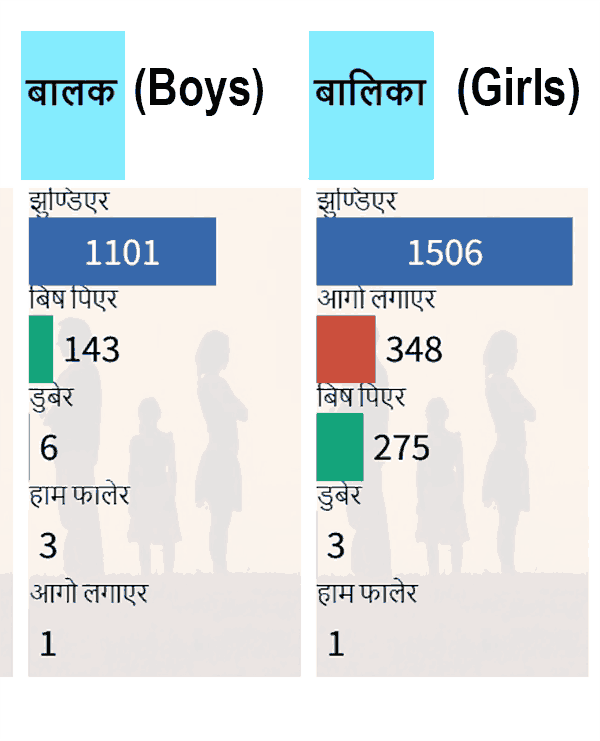
Returning to men…when found to have been guilty of raping an Australian woman in Melbourne six years ago, the twenty-nine year old Nepali man, for instance, refused to show any remorse (see below). That is, even after being found guilty in the court of law, he was unable to recognize or acknowledge that what he had done was wrong.
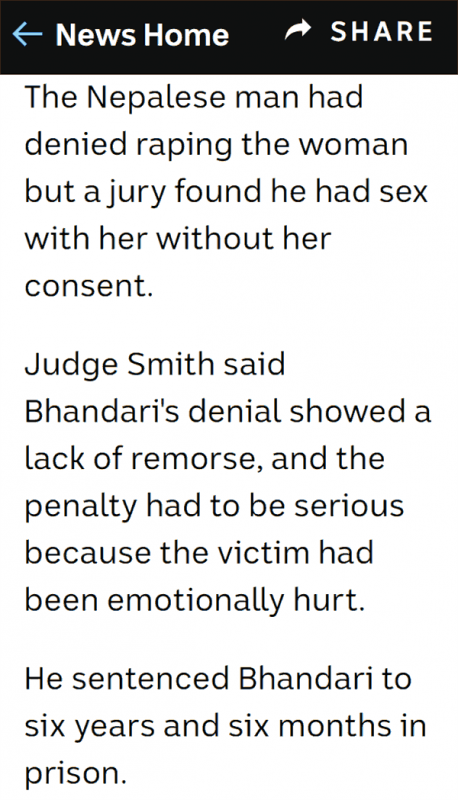
Not only was Bhandari remorseless, I came across Nepalis living in Australia who also believed in Bhandari’s innocence and that the victim was to blame.
More recently, a world-renown cricket player found guilty of raping a girl by the Patan Lower Court and sentenced to eight years in prison last December, Sandeep Lamichhane made the following posts early this month demonstrating his sense of entitlement as well as his arrogance.

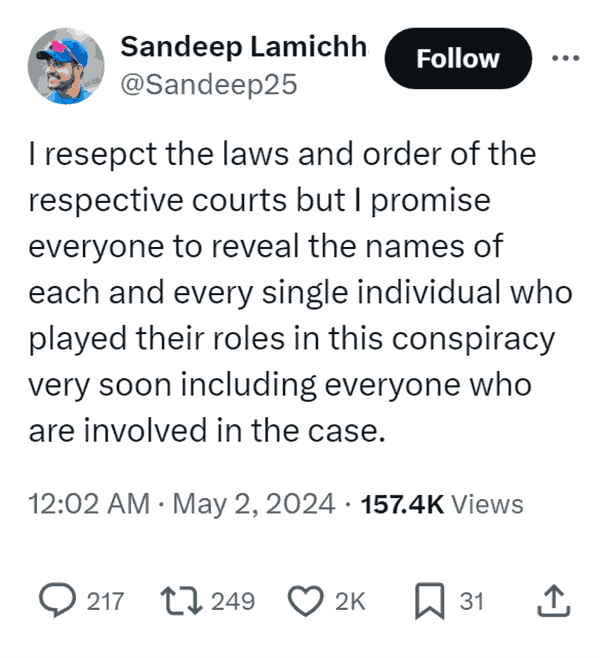
I wonder if the arrogance came from his knowledge that the Patan High Court would over-turn the lower court’s ruling and exonerate him just a couple of weeks later. This is the same man who disappeared back in Sept. 2020 on his way to Kathmandu — from the Caribbean — to surrender to the police and face charges of raping a minor.
Of course, it hasn’t escaped me that in the case of many Nepali men demonstrating their entitlement to many of the privileges they enjoy actually being imbued with arrogance, ignorance and stupidity may also be part of it.
We have a long way to go before a majority of Nepalis understand and recognize that the most important thing that they can give or provide their children is a very good education — an education that imparts valuable life-skills, both physical and cognitive — and to raise them to be compassionate human beings.
Those thoughts had crossed my mind in 2020 after learning about the Nepali male Reddit communities and their contents in May of that year and this time the Patan High Court’s despicable verdict on the Sandeep Lamichhane vs Gaushala 26 case last Wednesday.
For as long as Nepali parents raise their boys the way they have always done, for as long as Nepal does NOT educate its male children to be compassionate critical thinkers, for as long as the country keeps its population poorly educated — Nepali society will continue to produce the likes of entitled, arrogant, and ignorant average joes such as Bhandari, celebrities such as Lamichhane and their blind supporters.
What do you think?
(The blog post was adapted from this twitter thread and this Instagram post both of which were posted on May 11, 2020.)
